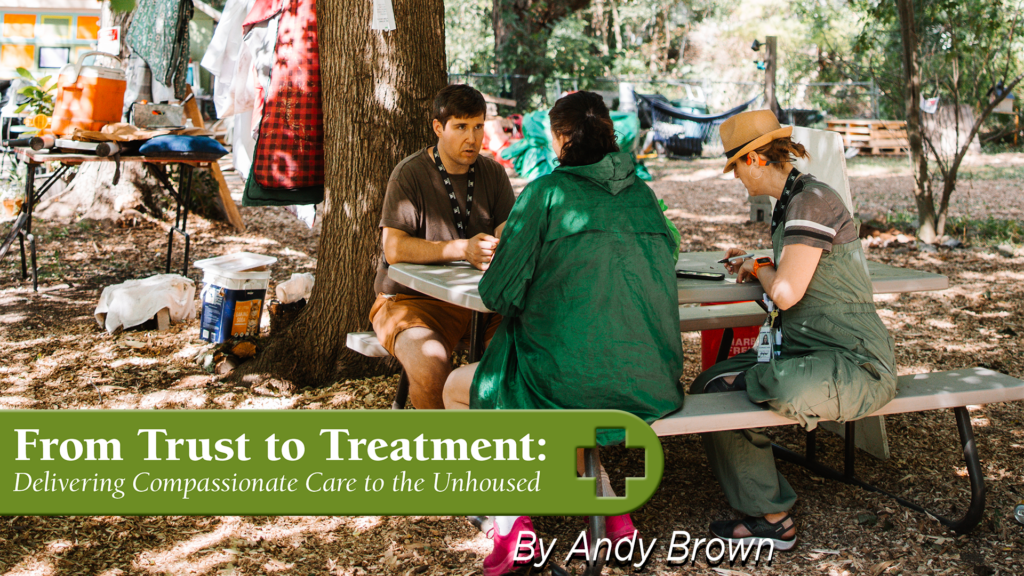
Nic Helmstetter, M.D., ’10 has been honored twice in the past two years by the Michigan Chapter of the American College of Physicians (MI-ACP) for being a face of compassion and professional excellence in Kalamazoo.
Most recently, the Kalamazoo College alumnus—a dual-boarded internal medicine and pediatric physician at Western Michigan University Homer Stryker M.D. School of Medicine—received the MI-ACP Fostering Diversity Award in October. It’s a high honor reserved for medical professionals who have outstanding accomplishments in advancing diversity in clinical medicine or research while providing access to care in relation to diverse populations.
“It was humbling, and I’m exceedingly grateful,” Helmstetter said. “Had you talked to me 10 years ago, I never would’ve guessed I’d be doing this work. It was very exciting and just unexpected.”
And in 2023, he received the Dr. Jan Rival Early Career Physician Award from MI-ACP, an honor bestowed to a physician who shows significant professional achievement in patient care, research and/or medical education, and a promising career as a physician. It recognized his work as an assistant professor at WMed, where he lectures to students, generally during their clinical rotations, while also bringing an addiction-medicine curriculum to campus through a statewide grant from the Michigan Collaborative Addiction Resources and Education System (MI-CARES). He was promoted to associate professor in January 2025.
“I quickly figured out during my residency training at the University of Michigan that when I finished, I wanted not just to see patients, which is great, but do more,” Helmstetter said. “I enjoyed interacting with medical students as a resident physician, and I wanted to continue that opportunity to teach.”
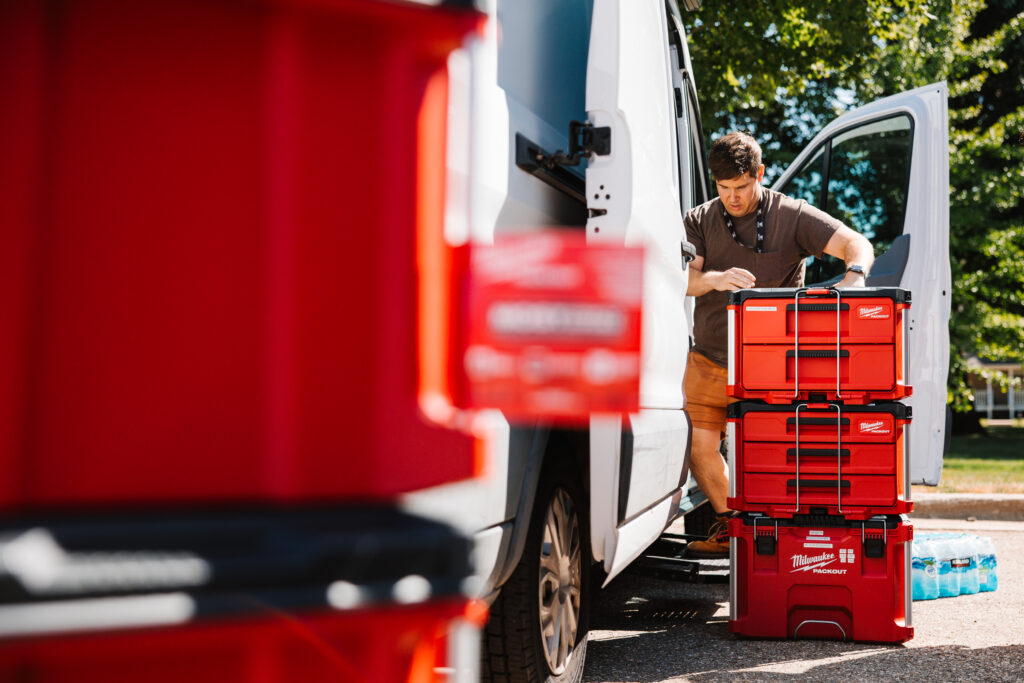
The idea that a K alumnus is receiving such recognition for great contributions to medicine is not surprising, although one of the primary drivers behind his diversity work is unique. Helmstetter is the associate program director for Street Medicine Kalamazoo (SMKzoo), an effort he joined through WMed in 2021. Through it, he has taken great pride in establishing a special model of care for unhoused and unsheltered people of Kalamazoo. It means he and his colleagues provide health care away from traditional doctors’ offices, hospitals and clinics to underserved populations, who otherwise might have no access to care.
“It’s certainly grown to be one of the favorite aspects of my work, and it’s one of the most important things I do,” Helmstetter said. “Not to minimize teaching our medical students, supervising and teaching our resident physicians, or some of the research I do. And being a husband and a parent is my No. 1 job. But I’m so happy to be doing this. I used to tell people that being a doctor is awesome, because I generally go to bed every night knowing that I did something good throughout the day, and that’s not always the case for every career. But adding street medicine, and having it be a growing part of my job, is indescribable.”
Helmstetter, who spent his high school years in Flushing, Michigan, said the practice allows him to take much of what he learned at K and apply it to his work life as a physician.
“I was signed up for the College of LSA (Literature, Science and the Arts) at the University of Michigan when a K recruiter came to our high school for football,” he said. “I had never contemplated the chance to play football in Division III, especially the historic MIAA. When I read more about K, I realized it was without a doubt the best college I had a hope of attending. I couldn’t pass up that opportunity for a great education and a chance to keep playing football. I don’t know what my life would look like if that recruiter hadn’t come to Flushing High School. I don’t know if I would have even become a doctor and street medicine physician if I’d gone anywhere else I was accepted. My experiences at K helped me know the basic sciences, but I also had time to take economics courses, philosophy courses, Spanish courses and study abroad in Madrid. I wouldn’t have had the habits, the work ethic, the world view or even the empathy to do this work. K got me ready for a lot of things, and it certainly made me ready to be an empathic and compassionate physician.”
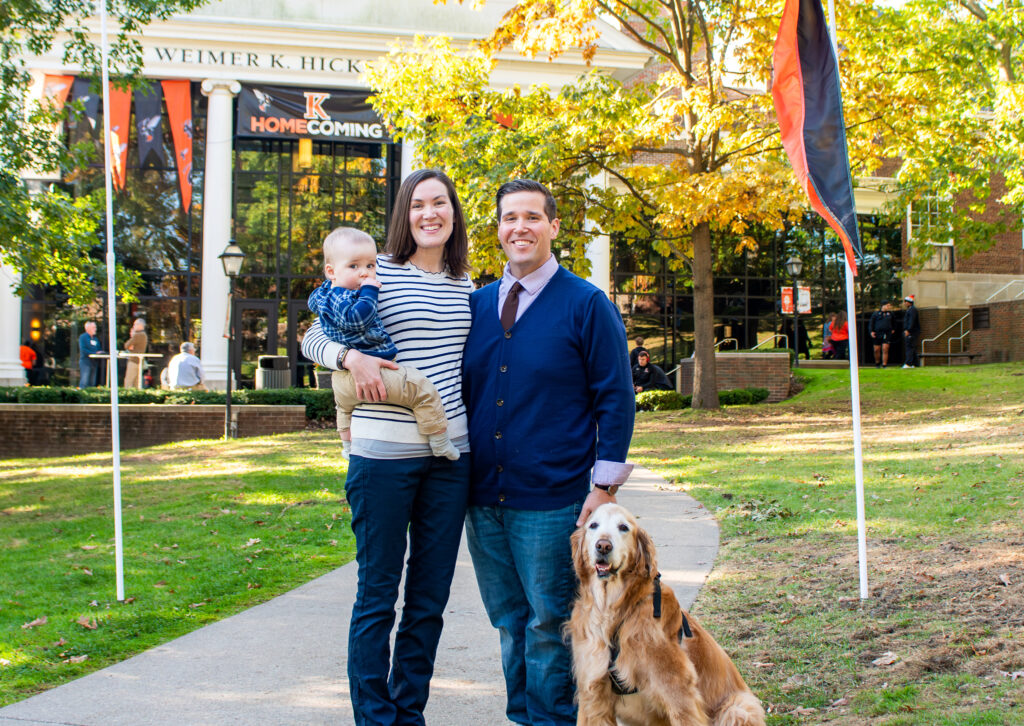
Helmstetter also met his wife, Elizabeth Haworth-Hoeppner ’10—now a physician and pediatric hospitalist at Bronson Methodist Hospital in Kalamazoo—at K during their first year and they got to know each other better in their sophomore year.
“I reserved a seat next to me in Spanish class and would artfully guide other folks away from it just for the chance to sit next to her and get to know her better,” he said. “We started studying together a lot, and it grew from there. Our relationship is founded in mutual respect and admiration for what we both do. Her father told me at some point before we married that we should strive to live for the other person and in doing so we should work to help and support them in any way we can. We try to stick to that motto every day.”
Meeting patients where they are
Out in the field, Helmstetter uses a street medicine technique called hotspotting to go places where the unhoused congregate—typically places where they can gather resources or where they will not be judged or asked to leave.
He and his colleagues travel in a Ford transit van outfitted with two exam rooms, exam and testing supplies and other items medical personnel commonly would need in a clinic. “The main goal of street medicine isn’t necessarily taking care of folks at shelters,” Helmstetter said, though the team does that as well. “It’s going out and seeing folks in the streets, in the woods where they’re camping, seeing the unsheltered unhoused, or in other words, the people that are sleeping rough. It can be really difficult to keep tabs on where folks are camping; we’re always having to figure out where folks are living and change up our rounding plans.”
The team hotspots on Mondays. On Wednesdays, Helmstetter and SMKzoo visit Ministry with Community and run a shelter clinic.
“We see patients throughout the afternoon until the shelter closes,” Helmstetter said. “Then, during the rest of the week, we have a phone triage line where our patients can text us and call us when they have access to a phone, and we’ll triage their concerns.”
The medical professionals use telemedicine and, based on the availability of clinicians and resident physicians, try some home visits and can arrange higher acuity of care such as emergency department visits or hospitalizations, if necessary, where SMKzoo also can be involved along this continuum of care.
“Some of our patients do get housed, but they still might have significant barriers to accessing care,” Helmstetter said. “They might not be on a bus line, or their apartment might be way out of town. They might not have a car, or they don’t want to go to a brick-and-mortar clinic or hospital due to past traumas. When they’re ill enough to need hospitalization, we admit them to our WMed Health inpatient teams at Ascension Borgess Hospital and Bronson Methodist Hospital, so they see some familiar faces. And I and my colleagues will communicate with the inpatient teams as well to do a warm handoff and transition that care if we’re not working inpatient ourselves that week.”
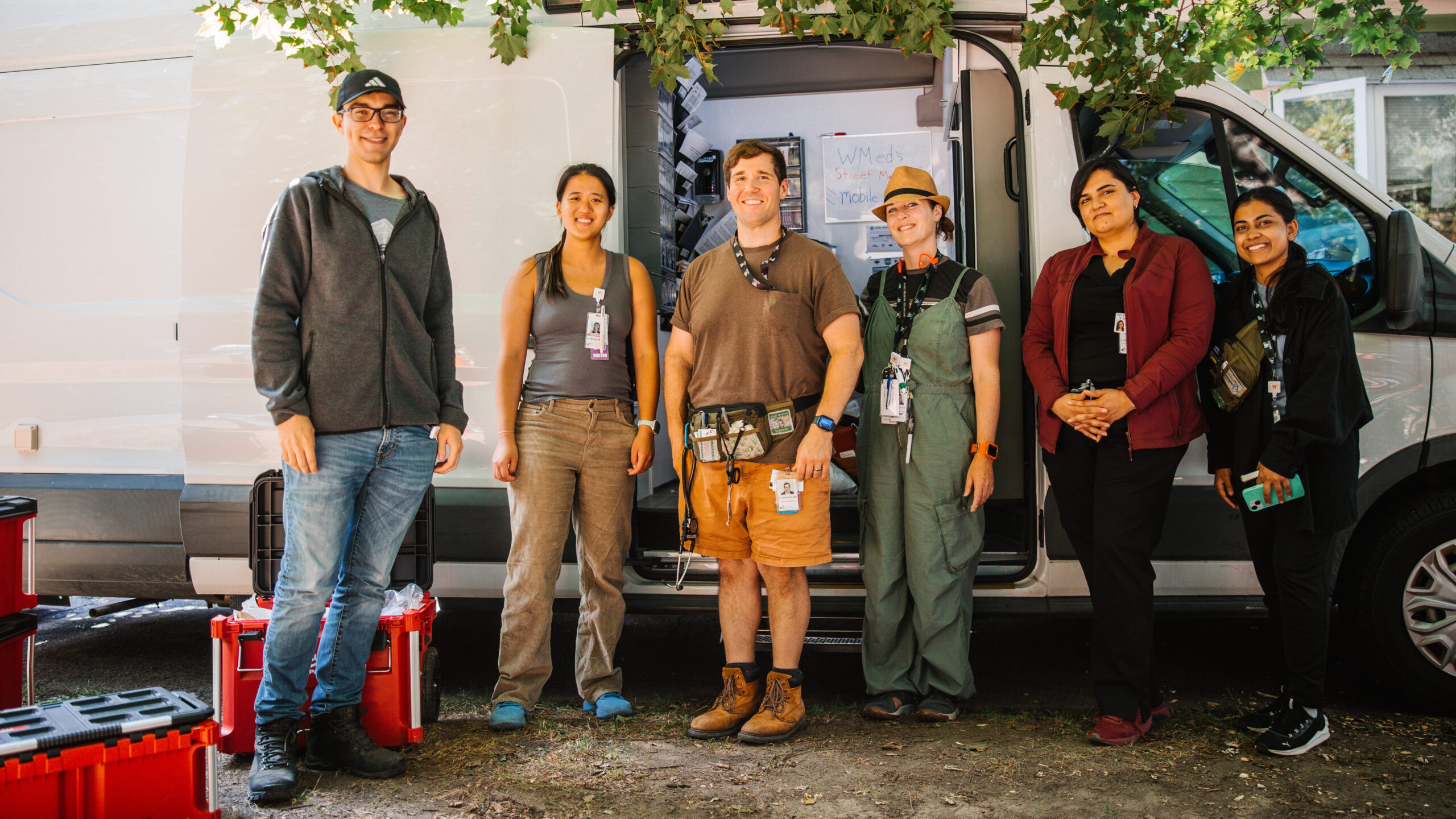
At its inception in 2021, SMKzoo relied on volunteer doctors. Program Director Sravani Alluri, M.D., M.S., began visiting an encampment in town near Riverview Drive and Gull Road because she noticed unhoused folks she treated in the hospital were missing follow-up clinic appointments.
“She started chatting with them and figured out where they were staying while building relationships, and the program grew from there,” Helmstetter said. “WMed fully supports the 30% of my time that is dedicated to taking care of SMKzoo patients, as well as a portion of my two other colleagues’ time. Outside of that salary support, the rest is funded through donations and grants. At this time, we are scaling up rather quickly. There’s just a huge need.”
Substance-use disorders are sometimes found within the populations he serves.
“A lot of folks may end up using substances because they’re available when prescription medicines aren’t,” Helmstetter said. “It might be to treat a symptom of an undiagnosed condition. Using a substance may make them feel better or at least more able to cope with the stress from living outdoors. I think folks that are housed assume the unsheltered unhoused are in the situation they’re in because of substance use and/or low mental health. You show me one patient like that, and I can easily find another whose symptoms are a direct result of living outside. We at SMKzoo believe that housing is healthcare and, like the United Nations (article 25), is a basic and universal human right.”
Helmstetter pointed out that Kalamazoo is a microcosm of the growing addiction crisis that faces the nation, particularly as stimulants like methamphetamines, and to a lesser extent, cocaine, mix with opioids. A New York Times article on the opioid crisis in November 2023 looked at encampments and treatment clinics in West Michigan to illustrate the treatment challenges clinicians face in an age where users often take multiple illicit substances, consciously or unconsciously. SMKzoo’s work was featured in the article.
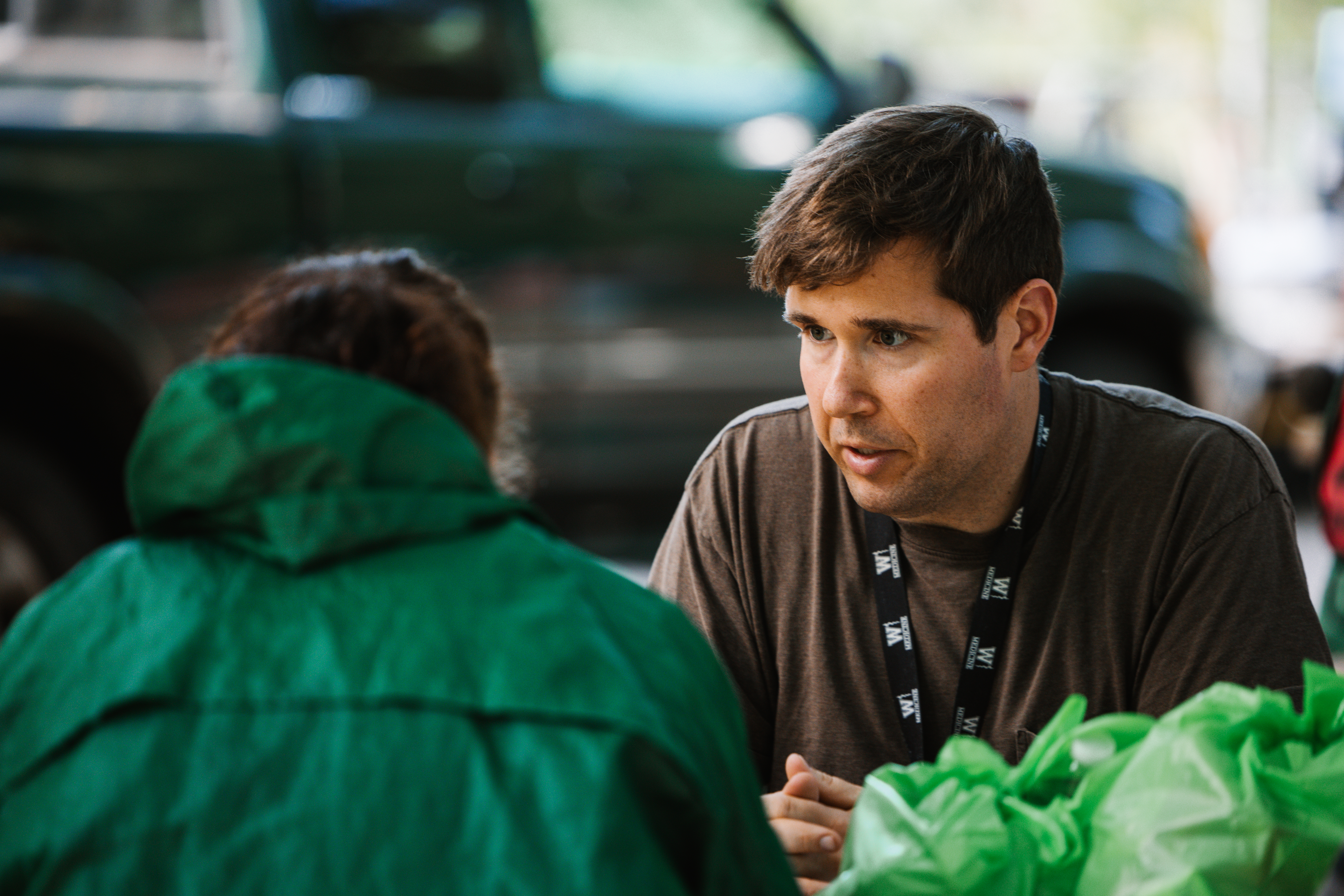
“Researchers are working on finding effective treatments. There are some in the pipeline, but right now there are only small studies for medications that can help folks. However, we have great medicines like buprenorphine or methadone for opioid-use disorder,” Helmstetter said. “Unfortunately, our drug supply is getting more dangerous. There are contaminants that can be just as life threatening as the substances themselves, like xylazine, also known as Tranq. Furthermore, sometimes folks think they’re using one substance, say a stimulant like cocaine, and it’s contaminated with an opioid like fentanyl. If their body is opioid naïve, they immediately overdose, often resulting in death, which we’re all too familiar with from the opioid epidemic headlines. This was unfortunately the case in Kalamazoo in 2023 leading to tens of fatal and nonfatal overdoses.”
Regardless, every patient’s story is different and access to care is one of the best things SMKzoo can provide.
“Most of our patients have Medicaid insurance as they have no income, although it can be difficult to keep them enrolled as many don’t have addresses, cell phones or identification of any kind,” he said. “It’s a matter of helping them maintain their enrollment or getting enrolled. There’s more to this work than just making diagnoses and prescribing treatments. We have so many ways that we want to grow. We’re always looking for more grants and support so we can better serve our patients.”
Volunteers are one resource that helps SMKzoo carry out its mission, in particular students who are pre-med or want to be pre-med.
“We have a couple of K students that volunteer with us. They do some outreach and engage with the unhoused population at one of the local parks downtown,” Helmstetter said. “They foster relationships with unhoused folks and distributing basic necessities like water, clothes, toiletries and seasonal acoutrements. Their work with us is a win-win as WMed has a preferred admissions relationship with K, which encompasses the WMedStart Early Decision Program. There’s a great institution right in their backyard.”
For students considering going into the medical field, these types of experiences are valuable, he advises.
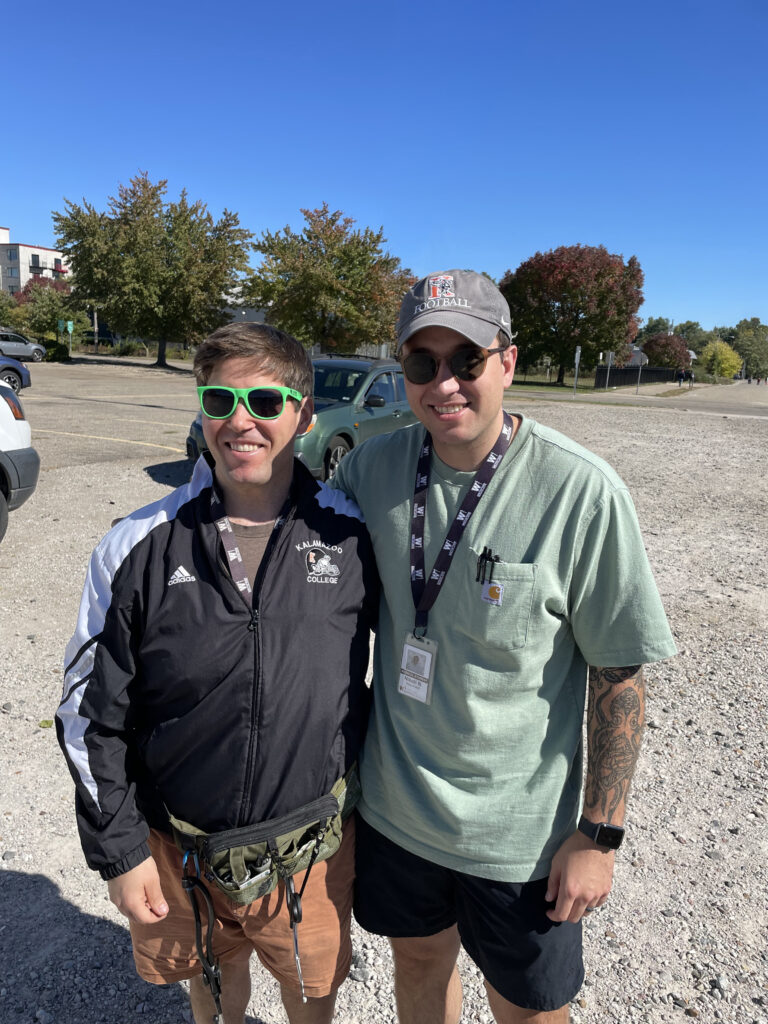
“K prepares you for so many different things, and the health care field is certainly one of them,” Helmstetter said. “Seek opportunities to explore the field and make sure it’s for you. Volunteer at hospitals and clinics or with organizations like SMKzoo to make sure it’s a good fit. It’s important work but it can be challenging, especially with the changing landscape in health care. And there are so many different things you can do within medicine. You don’t want to go in thinking that you’re only going to be seeing patients or that there are only a couple of specialties and care settings like a hospital or clinic. Similar to study abroad, find an experience where you can immerse yourself and get all the information you need before you make a big commitment.”
Helmstetter also noted that more people are taking gap years to gain experience or do something different before they apply to medical school.
“There’s no wrong door and there’s no right time to go to medical school,” he said. “Life isn’t a sprint, it’s a marathon, so take your time. Smell the roses and gain other experiences. Medical school will always be there. It’s a life-changing experience to help deliver care, get to know patients and have their trust. It’s a huge responsibility and a privilege to share in their stories.”